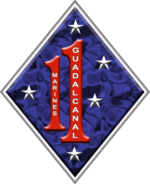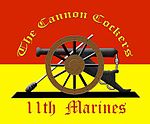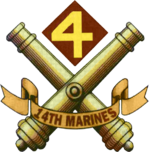
A Marine Expeditionary Unit is the smallest air-ground task force (MAGTF) in the United States Fleet Marine Force. Each MEU is an expeditionary rapid reaction force ready to answer any crisis, whether it be disaster aid or a combat mission. Marine Amphibious Unit (MAU) was the name used until the late 1980s.

A brigade is a major tactical military formation that typically comprises three to six battalions plus supporting elements. It is roughly equivalent to an enlarged or reinforced regiment. Two or more brigades may constitute a division.

Force Reconnaissance (FORECON) are United States Marine Corps reconnaissance units that provide amphibious reconnaissance, deep ground reconnaissance, surveillance, battle-space shaping and limited scale raids in support of a Marine Expeditionary Force (MEF), other Marine air-ground task forces or a joint force. Although FORECON companies are conventional forces they share many of the same tactics, techniques, procedures and equipment of special operations forces. During large-scale operations, Force Reconnaissance companies report to the Marine Expeditionary Force (MEF) and provide direct action and deep reconnaissance. Though commonly misunderstood to refer to reconnaissance-in-force, the name "Force" Recon refers to the unit's relationship with the Marine Expeditionary Force or Marine Air-Ground Task Force. Force reconnaissance platoons formed the core composition of the initial creation of the Marine Special Operations Teams (MSOTs) found in Marine Forces Special Operations Command (MARSOC) Raider battalions, though Marine Raiders now have their own separate and direct training pipeline.

A United States Marine Corps Reconnaissance Battalion is a reconnaissance unit within the Ground Combat Element (GCE) of a Marine Air-Ground Task Force (MAGTF) that conducts amphibious reconnaissance, underwater reconnaissance, advanced force operations, battlespace shaping, ground reconnaissance, surveillance, raids and direct action in support of the Marine division (MARDIV), subordinate division elements, or a designated MAGTF.
Combat service support is a topic that is, broadly speaking, a subset of military logistics. However, combat service support is often more limited in depth, as the related groups primarily address factors supporting readiness for combat operations. The United States Department of Defense organizes various agencies providing services such as medical assistance, for example, akin to other nations' militaries.

2nd Light Armored Reconnaissance Battalion is a fast and mobilized armored terrestrial reconnaissance battalion of the United States Marine Corps. Their primary weapon system is the 8-wheeled LAV-25 and they fall under the command of the 2nd Marine Division and II Marine Expeditionary Force. The unit is based out of the Marine Corps Base Camp Lejeune, North Carolina. The current mission statement of the battalion is: To perform combined arms reconnaissance and security missions in support of the Ground Combat Element (GCE) of a Marine Air-Ground Task Force (MAGTF). Its mission is to conduct reconnaissance, security and economy of force operations, and, within its capabilities, limited offensive or defensive operations that exploit the unit's mobility and firepower.
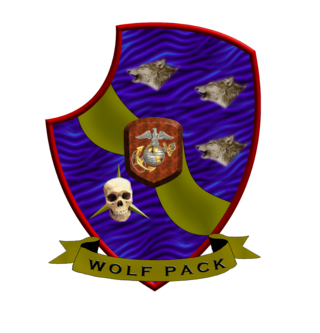
3d Light Armored Reconnaissance Battalion is a fast and mobilized armored terrestrial reconnaissance battalion of the United States Marine Corps. Their primary weapon system is the LAV-25 and they are part of the 1st Marine Division and I Marine Expeditionary Force. The unit is based out of the Marine Corps Air Ground Combat Center Twentynine Palms, California.
In the United States Marine Corps, a Marine air–ground task force is the principal organization for all missions across the range of military operations. MAGTFs are a balanced air–ground, combined arms task organization of Marine Corps forces under a single commander that is structured to accomplish a specific mission. The MAGTF was formalized by the publishing of Marine Corps Order 3120.3 in December 1963, "The Marine Corps in the National Defense, MCDP 1-0". It stated:
A Marine air–ground task force with separate air ground headquarters is normally formed for combat operations and training exercises in which substantial combat forces of both Marine aviation and Marine ground units are included in the task organization of participating Marine forces.
A regimental combat team (RCT) is a provisional major infantry unit which has seen use by branches of the United States Armed Forces. It is formed by augmenting a regular infantry regiment with smaller combat, combat support and combat service support units.
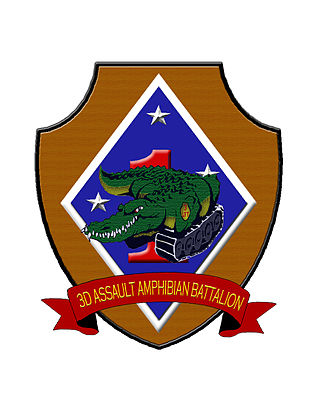
3rd Assault Amphibian Battalion is one of two active duty assault amphibian battalions in the United States Marine Corps. The battalion is tasked with transporting US Marine forces and their equipment from assault ships to shore, and equipped with the Amphibious Combat Vehicle (ACV), which replaced the Amphibious Assault Vehicle (AAV). The battalion is part of the 1st Marine Division and the I Marine Expeditionary Force. The unit is based in Camp Pendleton in California.
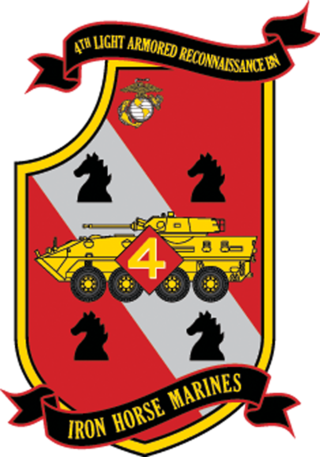
4th Light Armored Reconnaissance Battalion is a United States Marine Corps Light Armored Reconnaissance battalion of the Marine Corps Reserve. Their primary weapon system is the LAV-25 and they are part of the 4th Marine Division and Marine Forces Reserve. The unit headquarters is at Camp Pendleton, California, but other units in the battalion are located throughout the United States. 4th LAR Bn is the largest combat battalion in the Marine Corps, with 7 companies.

The Combat Assault Battalion was a mechanized battalion of the United States Marine Corps and subordinate element of the 3rd Marine Division and the III Marine Expeditionary Force. The unit was last based at Camp Schwab, Okinawa, Japan.
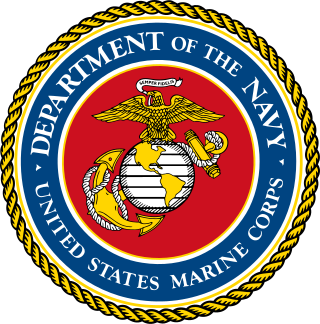
The United States Marine Corps is organized within the Department of the Navy, which is led by the Secretary of the Navy (SECNAV). The most senior Marine commissioned officer is the Commandant of the Marine Corps, responsible for organizing, recruiting, training, and equipping the Marine Corps so that it is ready for operation under the command of the unified combatant commanders. The Marine Corps is organized into four principal subdivisions: Headquarters Marine Corps, the Operating Forces, the Supporting Establishment, and the Marine Forces Reserve.
A Marine expeditionary brigade (MEB) is a formation of the United States Marine Corps, a Marine air-ground task force of approximately 14,500 Marines and sailors constructed around a reinforced infantry regiment, a composite Marine aircraft group, a combat logistics regiment and a MEB command group. The MEB, commanded by a general officer (usually a brigadier general), is task-organized to meet the requirements of a specific situation. It can function as part of a joint task force, as the lead echelon of the Marine expeditionary force (MEF), or alone. It varies in size and composition, and is larger than a Marine expeditionary unit (MEU) but smaller than a MEF. The MEB is capable of conducting missions across the full range of military operations.
In the United States Army, the term combat support refers to units that provide fire support and operational assistance to combat elements. Combat support units provide specialized support functions to combat units in the following areas:
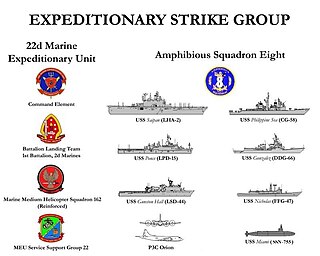
In the United States Navy, the expeditionary strike group (ESG) is a coordinated group of surface ships, aircraft, submarines, and other naval assets. In contrast to carrier strike groups (CSGs), which emphasize air power and are led by a supercarrier, ESGs are strongly suited for amphibious warfare and are led by an amphibious assault ship. The ESG concept was introduced in the early 1990s, based on the Naval Expeditionary Task Force. The U.S. Navy fields nine expeditionary strike groups.
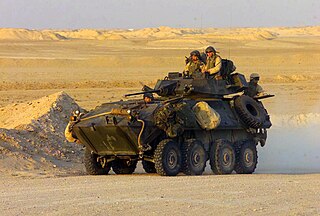
The United States Marine Corps Light Armored Reconnaissance Battalions, or LAR Battalions, are fast and mobilized armored terrestrial reconnaissance units that conduct reconnaissance-in-force (RIF) ahead of the battalion landing teams or division infantry forces. They mainly provide the Marine Air-Ground Task Force and the Marine Expeditionary Unit commanders vital intelligence of the enemy.
The reconnaissance mission within the United States Marine Corps is divided into two distinct but complementary aspects; Marine Division Recon and Force Reconnaissance.


